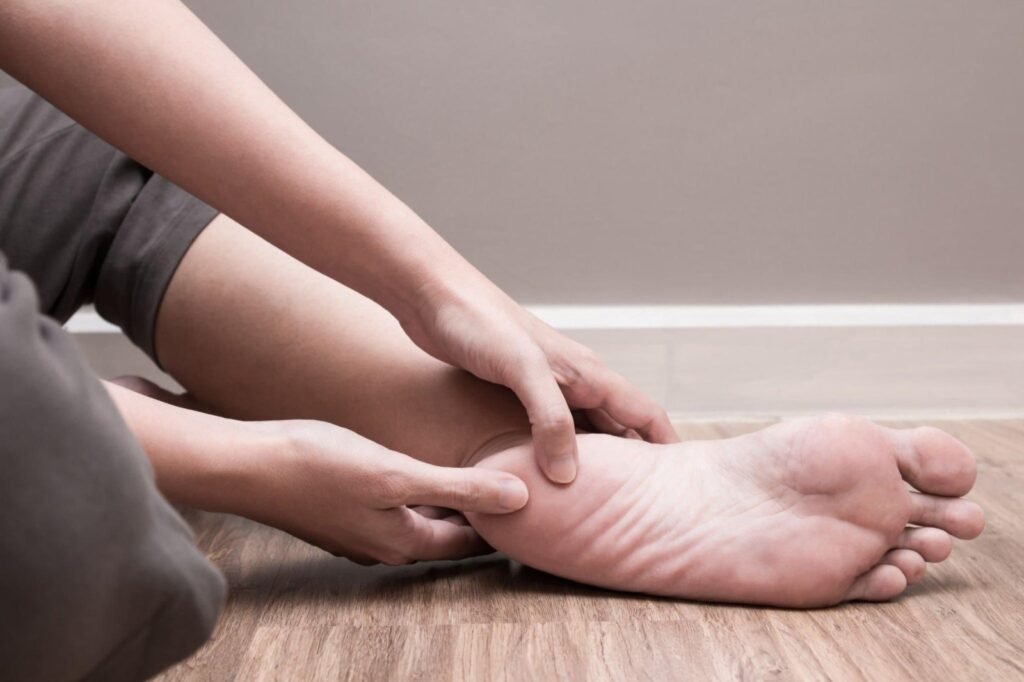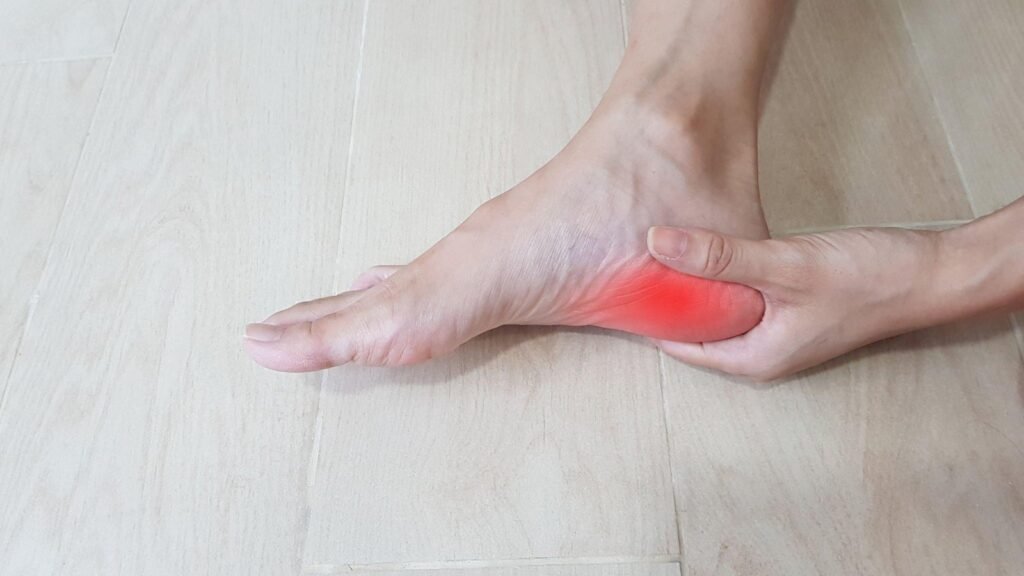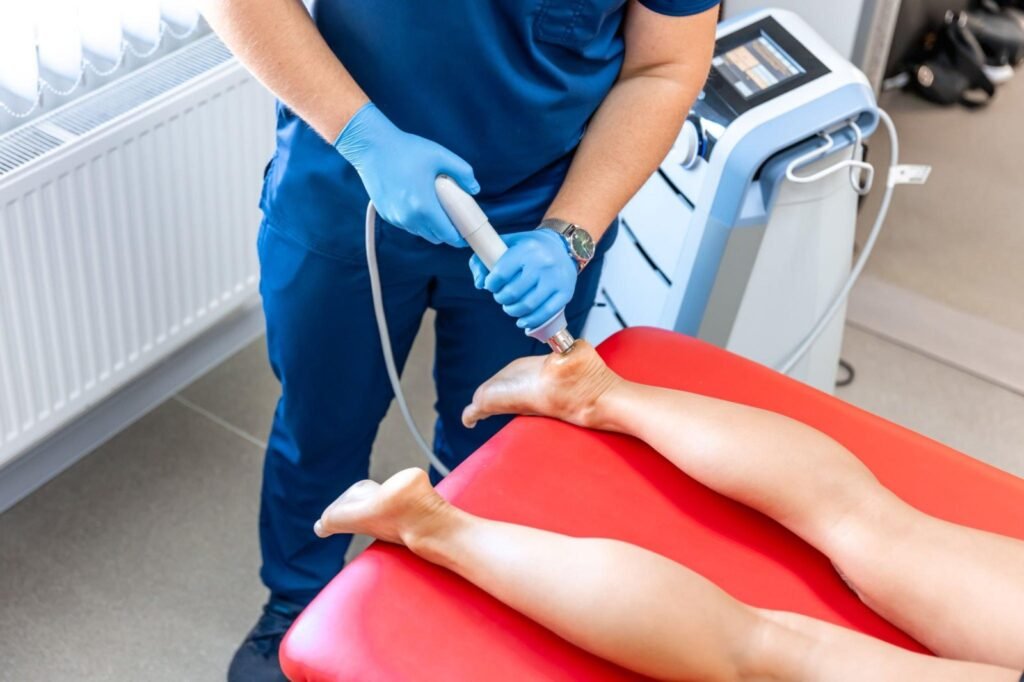PLANTAR FASCIITIS

Addressing plantar fasciitis alongside
Nebraska's top-tier foot and ankle specialists
Addressing plantar fasciitis alongside Nebraska's top-tier foot and ankle specialists
PLANTAR FASCIITIS Q&A

WHAT IS PLANTAR FASCIITIS?
Plantar fasciitis is a common condition that causes pain in the heel and arch of the foot. It is caused by inflammation of the plantar fascia, a thick band of tissue that runs across the bottom of the foot, connecting your heel bone to your toes. The plantar fascia supports the arch of the foot and helps with shock absorption.
When strained or stressed, tiny tears can occur in the fascia, resulting in pain and discomfort. Plantar fasciitis is often associated with factors such as standing for a long period, running or walking, as well as improper footwear or abnormal foot mechanics. Although the issue is common, many people find relief from the related discomfort with plantar fasciitis therapies and appropriate care.
WHAT ARE THE SYMPTOMS OF PLANTAR FASCIITIS?
When described by our team of foot doctors in Nebraska, the symptoms of plantar fasciitis are portrayed as a combination of discomfort and limitations. Patients often report a sharp, stabbing heel pain, particularly during the initial steps after waking up or following periods of rest. This pain may gradually subside as the foot limbers up but can intensify after prolonged periods of standing or activity. Nebraska's specialists emphasize the potential for the pain to manifest along the arch of the foot, highlighting the role of the inflamed plantar fascia in this widespread discomfort.
They also highlight how sensitive the heel is, and how the condition may be accompanied by pain and swelling, which can further limit one's range of motion and everyday activities. Our team wants to provide Nebraskans with a thorough understanding of plantar fasciitis so that they can take early action and treat the condition effectively. We will do this by explaining these symptoms.
Detailed explanation of the common symptoms include:
- Heel Pain: A distinguishing symptom is a sharp or stabbing heel pain. This pain is often most noticeable when taking the first steps after waking up or after periods of rest.
- Pain After Rest: Discomfort may also arise after sitting for an extended period or when getting up after rest. The initial steps can be particularly painful.
- Arch Pain: Some people may experience pain across the arch of the foot, highlighting the involvement of the plantar fascia in this condition.
- Tenderness: The heel may be tender to the touch, and swelling can occur in some cases.
- Increased Pain with Activity: Prolonged standing, walking, or activities that stress the foot can exacerbate the pain.
It's important to note that symptoms can vary from person to person, and early intervention through proper diagnosis and treatment is crucial for effective plantar fasciitis treatment.


WHAT ARE THE RISK FACTORS FOR PLANTAR FASCIITIS?
According to our foot and ankle doctors in Nebraska, different risk factors contribute to the development of plantar fasciitis, shedding light on the nuanced interplay of lifestyle and physiological factors.
Our foot and ankle doctors emphasise the following key elements:
- Foot Structure: Individuals with flat foot or high arches have more chances of development to plantar fasciitis due to altered weight distribution and increased stress on the plantar fascia.
- Improper Footwear: Wearing shoes with an improper fit can contribute to the onset of plantar fasciitis. Nebraska specialists stress the importance of footwear tailored to individual foot mechanics.
- Occupational Factors: Prolonged standing or walking on hard surfaces, common in certain professions, can increase the risk of plantar fasciitis.
- Physical Activity: High-impact activities like running or activities that put repetitive stress on the heel, such as ballet or aerobic dancing, can increase the likelihood of plantar fasciitis. Our foot and ankle doctors in Nebraska recommend proper warm-ups and supportive footwear for active individuals.
- Age: It is more prevalent in individuals between 40 and 60 years old, reflecting the natural ageing process and changes in foot mechanics over time.
- Obesity: Excess body weight can strain the plantar fascia, making obesity a significant risk factor. Our specialists emphasise the role of weight management in preventing and managing plantar fasciitis.
Other risk factors for plantar fasciitis include:
- Pregnancy: Pregnant women are more likely to develop plantar fasciitis due to hormonal changes that can cause the ligaments in the feet to loosen.
- Certain medications: Some medications can increase the risk of developing plantar fasciitis.
- Diabetes: People with diabetes are more likely to develop plantar fasciitis due to nerve damage that can affect the feet.
Entrust your foot health to our skilled specialists and experience unparalleled plantar fasciitis treatment in Nebraska. We prioritise comprehensive care that promotes overall well-being.
HOW IS PLANTAR FASCIITIS DIAGNOSED?
Plantar fasciitis is typically diagnosed based on a thorough medical history, physical examination, imaging tests and foot biomechanics evaluation.
Medical History
Your doctor will inquire about your symptoms, including the location and severity of pain, when the pain occurs, and any activities or factors that aggravate or alleviate the pain. They will also ask about your medical history, including any previous injuries, surgeries, or underlying medical conditions that could contribute to heel pain.
Physical Examination
During the physical examination, your doctor will carefully inspect your feet, paying particular attention to the heel and arch area. They will palpate the plantar fascia to assess for tenderness, inflammation, or thickening. They will also evaluate your range of motion in the ankle and assess your gait (walking pattern) to identify any abnormalities.
Imaging Tests
While imaging tests are not always necessary for diagnosing plantar fasciitis, they may be ordered in certain cases to rule out other potential causes of heel pain, such as bone spurs, arthritis, or stress fractures. While not always necessary, Nebraska specialists may recommend imaging studies such as X-rays or ultrasound to rule out other conditions, such as stress fractures or heel spurs, and to visualise the extent of inflammation in the plantar fascia.
Foot Biomechanics Evaluation
Analysing the individual's foot structure and biomechanics is crucial. Nebraska specialists may observe how the patient walks or runs to identify any abnormalities contributing to the condition.
By combining these diagnostic elements, foot and ankle doctors in Nebraska can formulate a precise diagnosis of plantar fasciitis. This thorough assessment enables them to develop a tailored plantar fasciitis treatment plan, addressing the specific needs and lifestyle factors of each patient.


HOW IS PLANTAR FASCIITIS TREATED?
Plantar fasciitis is approached with a combination of conservative treatments aimed at relieving pain and promoting healing.
The plantar fasciitis treatment plan crafted by foot and ankle doctors in Nebraska typically includes:
- Rest and Ice: Nebraska specialists recommend reducing activities that exacerbate the pain and applying ice to the affected area to alleviate inflammation. Resting the foot allows the plantar fascia to heal.
- Stretching Exercises: Specific stretching exercises for the Achilles tendon and plantar fascia help improve flexibility and reduce tension. Nebraska specialists often provide guidance on appropriate stretching routines.
- Supportive Footwear: Wearing shoes with adequate arch support and cushioning is crucial. Nebraska specialists may suggest orthotic inserts to provide additional support and alleviate strain on the plantar fascia.
- Night Splints: Wearing night splints can help maintain the foot in a dorsiflexed position, preventing the plantar fascia from tightening overnight and reducing morning pain.
- Physical Therapy: Nebraska specialists may recommend physical therapy to address underlying biomechanical issues, improve strength and flexibility, and enhance overall foot function.
- Corticosteroid Injections: In some cases, Nebraska specialists may administer corticosteroid injections to provide targeted relief from inflammation and pain.
- Weight Management: For individuals with excess body weight, Nebraska specialists emphasise the importance of weight management to reduce strain on the plantar fascia.
Surgery is typically considered only when conservative treatments fail to provide relief. Nebraska specialists tailor the treatment plan to the unique needs of each patient, aiming to alleviate pain, promote healing, and prevent the recurrence.




